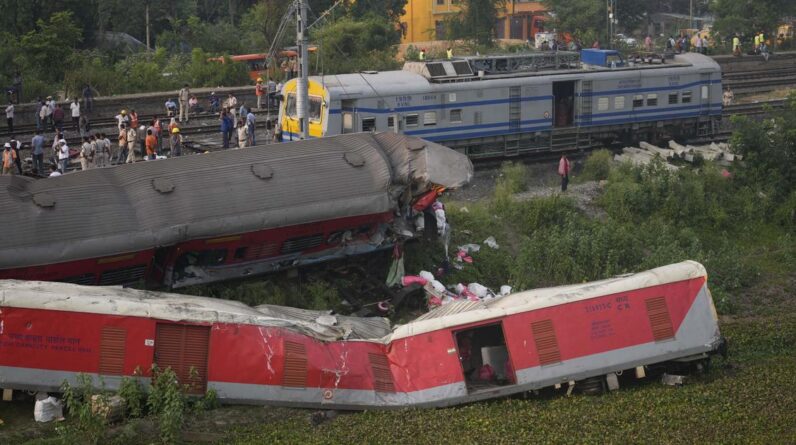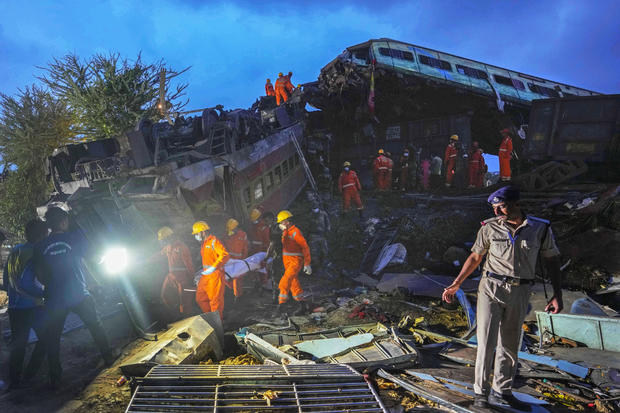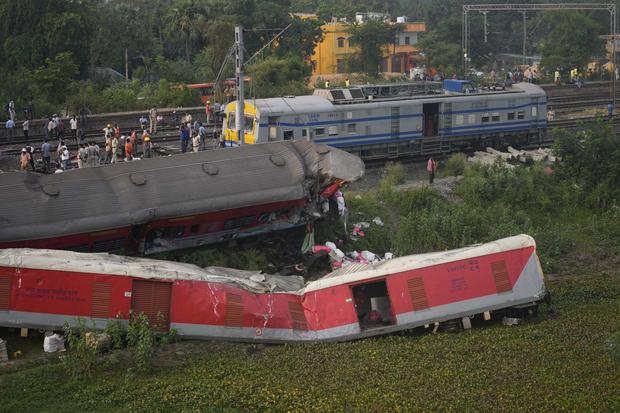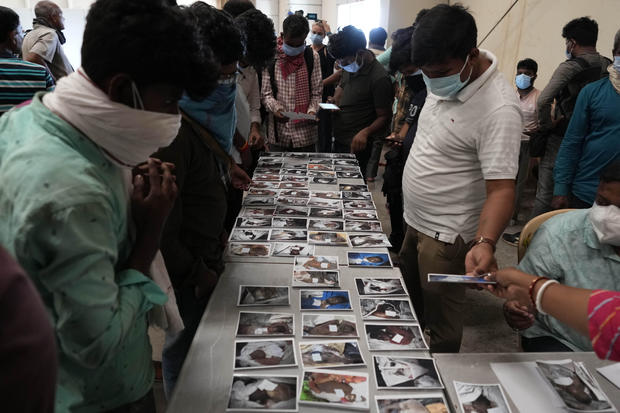
It caused an electronic signaling system error the train derailment in India that killed nearly 300 people and injured hundreds more, authorities said Sunday. The error caused a train to wrongly change tracks and collide with a freight train in the eastern Indian state of Odisha, creating a disastrous pile-up that also involved a second passenger train.
Authorities worked to clear the mangled wreckage of two passenger trains that derailed in Odisha’s Balasore district on Friday night in one of the country’s deadliest rail accidents in decades.
A statement from the Odisha government on Sunday revised the death toll to 275. More than 850 more people were injured on Saturday night, authorities said. Earlier on Saturday, the Indian Army helped the police and the National Disaster Response Force, as well as other rescue teams, to search for survivors.
“We don’t have much hope of rescuing anyone alive,” Sudhanshu Sarangi, chief of Odisha’s fire services, told reporters on Saturday morning. Images from the crash site showed bodies lined up along the train tracks as authorities transported injured survivors to hospitals. Odisha Chief Secretary Pradeep Jena said at the time that more than 200 ambulances were in service.
AP Photo/Rafiq Maqbool
Jaya Verma Sinha, a senior railway official, said preliminary investigations revealed that the high-speed Coromandel Express was signaled to run on the main line of the track, but the signal was later changed and the train it entered an adjacent loop line where it collided with a cargo loaded with iron ore.
The collision overturned the Coromandel Express coaches onto another track, causing the Yesvantpur-Howrah Express coming from the opposite side to also derail, he said.
The passenger trains, carrying 2,296 people, were not speeding, he said. Freight trains usually park on an adjacent loop line, so the main line is clear for a passing train.
Verma said the main cause of the accident was related to a fault in the electronic signaling system. He said a detailed investigation will reveal whether the error was human or technical.
AP Photo/Rafiq Maqbool
The electronic interlocking system is a safety mechanism designed to avoid conflicting movements between trains. It also monitors the status of signals that tell drivers how far they are from an oncoming train, how fast they can go and the presence of trains parked on the track.
“The system is 99.9% error free, but there is always a 0.1% chance of error,” Verma said. Asked if the crash could be a case of sabotage, he said “nothing is being ruled out.”
On Sunday, a few wrecked, wrecked and overturned carriages were the only remains of the tragedy. Railroad workers toiled in the blazing sun to lay cement blocks to fix the broken tracks. A crew with bulldozers was removing mud and debris to clear the crash site.
At one of the hospitals nearly 9 miles from the site, survivors spoke of the horror of the moment of the crash.
Pantry worker Inder Mahato could not remember the exact sequence of events, but said he heard a loud bang as the Coromandel Express crashed into the goods. The impact caused Mahato, who was in the bathroom, to briefly lose consciousness.
Moments later, when he opened his eyes, he saw through the door he had forced open people writhing in pain, many of them already dead. Others were frantically trying to get out of the twisted wreckage of their wagon.
For hours, Mahato, 37, was trapped in the train’s bathroom, before rescuers disentangled the remains and pulled him out.
“God saved me,” he said, lying in a hospital bed while recovering from a hairline fracture to his sternum. “I’m very lucky to be alive.”
Mahato’s friends were not so lucky. Four of them died in the crash, he said.
AP Photo/Rafiq Maqbool
Meanwhile, many desperate relatives struggled to identify the bodies of their loved ones due to the brutality of the injuries. Few others were looking for hospitals to check if their relatives were alive.
At the same hospital where Mahato was recuperating from her injuries, Bulti Khatun wandered outside the premises in a dazed state, carrying the identity card of her husband who was aboard the Coromandel Express traveling south of the Chennai city.
Khatun said she visited the morgue and other hospitals to look for him, but could not find him.
“I’m so helpless,” she said, sobbing.
By Saturday evening, 15 bodies had been recovered and efforts continued overnight with heavy cranes being used to remove an engine which was installed on top of a carriage. No bodies were found in the engine and the work was completed on Sunday morning, said Sudhanshu Sarangi, director general of fire and emergency services in Odisha.
The accident comes as Prime Minister Narendra Modi focuses on modernizing the British colonial-era railway network in India, which has become the world’s most populous country with 1,420 millions of inhabitants. Despite the government’s efforts to improve safety, hundreds of accidents occur every year on the Indian Railways, the world’s largest rail network under one management.
Modi visited the accident site on Saturday and spoke to rescue officials. He also visited a hospital to inquire about the injured and spoke to some of them.
Modi told reporters that he felt the pain of the accident victims. He said the government would do everything possible to help them and strictly punish those responsible.
In 1995, two trains collided near New Delhi, killing 358 people in one of India’s worst rail accidents. In 2016, a passenger train derailed between the cities of Indore and Patna, killing 146 people.
Most of these accidents in India are due to human error or outdated signaling equipment.
About 22 million people ride 14,000 trains across India every day, traveling over 40,000 miles of track.
Trending news
[ad_2]
Source link








